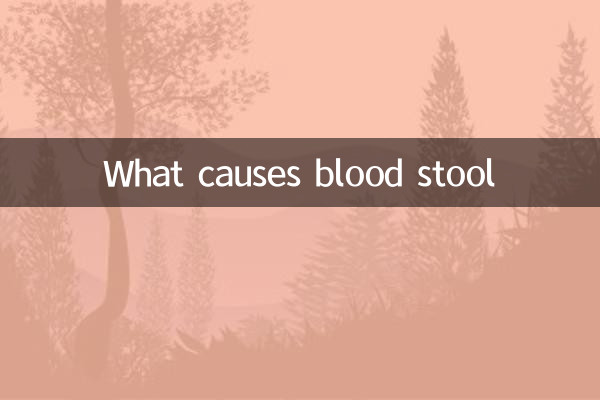What causes blood stool
Bloody stool refers to blood in the feces during defecation, which may be bright red, dark red or black. The appearance of bloody stools often makes people feel panicked, but it does not necessarily mean a serious illness. Understanding common causes of bloody stool can help seek medical treatment in a timely manner and take correct treatment measures. The following is a summary of the causes of blood stools in the popular topics and hot content searched on the entire network in the past 10 days.
1. Common causes of bloody stool

There are many causes of bloody stool, which may be manifestations of gastrointestinal bleeding or anal or rectal problems. Here are some common causes:
| reason | symptom | Common people |
|---|---|---|
| hemorrhoid | Bright red bloody stool, pain or itching during defecation | Sitting for a long time, constipation or pregnant women |
| Anal fissure | Severe pain during bowel movements, bright red bloody stools | Patients with constipation or diarrhea |
| Pediatric ulcer | Black or dark red bloody stools, which may be accompanied by abdominal pain | People who take NSAIDs for a long time or are under high stress |
| colitis | Bloody stools accompanied by diarrhea and abdominal pain | Immune system abnormality or infection |
| Colon polyps or tumors | Bloody stools may be painless, accompanied by weight loss or changes in bowel habits | Middle-aged and elderly people or have family history |
2. The relationship between the color of bloody stool and the cause of the disease
The color of the bloody stool can help to determine the location of the bleeding:
| Bloody stool color | Possible bleeding site | Common Causes |
|---|---|---|
| Bright red | Anus or rectum | Hemorrhoids, anal fissures |
| Dark red | Colon or small intestine | Colitis, polyps |
| Black (asphalt) | Stomach or duodenum | Gastrointestinal ulcers, gastric cancer |
3. Situations that need to be vigilant
Although bloody stools do not necessarily mean serious illness, medical treatment is required immediately in the following situations:
1.Massive bleeding: For example, high blood stool or accompanied by anemia symptoms such as dizziness and fatigue.
2.Weight loss: Weight loss without obvious reasons may be related to tumors.
3.Changes in bowel habits: If long-term constipation or diarrhea suddenly worsens.
4.Family History: Those with a family history of colon cancer or other digestive tract diseases should check as early as possible.
4. How to prevent bloody stool
1.Dietary adjustment: Eat more fiber-rich foods, such as vegetables, fruits and whole grains, and avoid spicy and irritating foods.
2.Keep your bowel movements smooth: Avoid sitting for a long time, exercise moderately, and prevent constipation.
3.Regular physical examinations: Especially for middle-aged and elderly people with family history, colonoscopy should be performed regularly.
4.Avoid drug abuse: If non-steroidal anti-inflammatory drugs may damage the gastric mucosa, they must be used as prescribed by the doctor.
5. Summary
There are many causes of bloody stool, ranging from mild hemorrhoids to severe colon cancer. By observing the color and accompanying symptoms of the bloody stool, the cause can be initially judged, but the final diagnosis still depends on the examination of a professional doctor. If bloody stools occur, especially when accompanied by other discomfort symptoms, seek medical treatment in time to avoid delayed treatment.

check the details

check the details